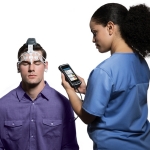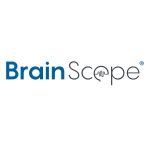Over 30% Reduction in Unnecessary Head CT Scans When Integrating FDA-Cleared BrainScope One

Use in the Emergency Room demonstrates BrainScope One can
reduce patient radiation exposure, decrease use of hospital resources,
and shorten throughput times
BETHESDA, Md.–(BUSINESS WIRE)–lt;a href=”https://twitter.com/hashtag/Concussion?src=hash” target=”_blank”gt;#Concussionlt;/agt;–BrainScope announced today the publication of a study conducted by
physicians at Washington University Barnes Jewish Medical Center in St.
Louis in the peer-reviewed journal The American Journal of Emergency
Medicine entitled “Reduction in unnecessary CT scans head-injury in
the emergency department using an FDA cleared device.” The study
demonstrated that the FDA-cleared BrainScope One medical device
reduced the use of unnecessary head CT scans by nearly one-third in a
hospital emergency room setting when compared to the use of standard
clinical practice.
Emergency Room (ER) visits for mild Traumatic Brain Injury (mTBI) have
greatly increased due to increased awareness of potential consequences
of such injuries, with roughly 5 million Americans seeking medical care
for head injury in ERs each year. While the vast majority (>80%) of
head-injured patients who go to the ER receive a head CT scan, more than
90% of them are found to be negative. This practice unnecessarily
exposes these patients to radiation, increases the use of hospital ER
resources, and lengthens throughput times.
BrainScope’s flagship BrainScope One product, which is
commercially available today, is a multi-modal, comprehensive, handheld
system that helps clinicians objectively and rapidly assess and triage
head injured patients directly at the point of care. BrainScope One
is the first and only FDA-cleared medical device to offer capabilities
to assess the full spectrum of brain injury – from concussions
(functional abnormality) to brain bleeds (structural injury) – for those
with mTBI. BrainScope One is being successfully used in a
cross-section of market segments including: urgent care and occupational
health clinics; concussion clinics; hospital emergency rooms; the U.S.
military; university sports and student health centers; professional
sports; and pharmaceutical clinical trials.
In the study, ninety-one (91) patients presenting to the ER within 3
days of sustaining a closed head injury (with a mean time since injury
of 10.8 hours) were evaluated at Barnes-Jewish Hospital Washington
University Medical Center ER. Patients were 18-76 years of age, and all
but one had a Glasgow Coma Scale (GCS) score of 15 (one patient GCS=14).
Eighty-two percent (82%) of the injuries were caused either by motor
vehicle collisions or falls. All ninety-one patients were referred for a
head CT scan, which was read by the site neuroradiologist and evaluated
for related traumatic brain injury. Patients also received a 5-10 minute
BrainScope EEG-based Structural Injury Classifier (“SIC”) evaluation
using a proprietary disposable EEG headset, which is rapidly and easily
placed on the forehead region. Physician assistants, nurses and/or
technicians administered the BrainScope evaluation, which utilizes
proprietary Artificial Intelligence (AI) – based algorithms to provide
clinically-relevant information to determine whether a patient is likely
CT positive (structural brain injury) or likely CT negative (no
structural brain injury).
The study demonstrated that BrainScope One can help health care
professionals determine the need for a CT scan, helping avoid
unnecessary imaging and associated radiation exposure to patients,
reduce throughput times and better triage patients who require a CT
scan. Based on this study, integrating BrainScope’s EEG-based objective
SIC into the decision-making process for CT referrals would have led to
a significant reduction of unnecessary CT scans by approximately 31%.
Importantly, this decrease in CT use and its associated radiation would
be achieved without incurring any false negative cases (100% sensitivity
in the study). This study confirmed BrainScope’s overall CT referral
rate reduction results published by Huff and colleagues (2017)1
in a retrospective study of the data collected in the BrainScope FDA
validation study2.
The paper’s lead author, Dr. Rosanne Naunheim, stated, “The use of such
rapidly obtained, objective information has the potential to reassure ED
physicians in making confident clinical decisions that their patients do
not need a CT, and will go a long way toward decreasing unnecessary
radiation, decreasing the cost of care.”
“These results clearly demonstrate the powerful capabilities of BrainScope
One. Over the past decade, we have created a proprietary
multi-modal, multi-parameter FDA-cleared technology that is used by
clinicians today in a variety of settings to assess for both structural
injury, as well as functional injury known as concussion,” stated
Michael Singer, BrainScope CEO. “In partnership with the U.S. Department
of Defense through 8 research contracts, our technology has been created
and validated through over 20 clinical studies, 27 peer reviewed
publications, and 7 FDA Clearances. We continue to demonstrate
BrainScope’s clinical utility to cost effectively help clinicians assess
the millions of American head-injured patients. Our current customers
confirm the great benefit of our medical technology for assessment of
the full range of mild traumatic brain injury and concussion.”
For more information about the BrainScope technology, visit www.brainscope.com/products.
The publication can be found and cited as follows: R. Naunheim, M.K.
Koscso and R. Poirier, Reduction in unnecessary CT scans head-injury in
the emergency department using an FDA cleared device, American Journal
of Emergency Medicine, https://doi.org/10.1016/j.ajem.2019.04.037.
About BrainScope
BrainScope’s mission is to revolutionize the rapid and objective
assessment of brain-related conditions, starting with concussion and
mild traumatic brain injury, utilizing multiple integrated assessment
capabilities, artificial intelligence (AI) and digitization within a
culture of quality, excellence and entrepreneurialism. The Company’s
first product, BrainScope One, incorporates a multi-modal,
multi-parameter panel of assessment capabilities including EEG-based
technology that is non-invasive for mildly presenting head-injured
patients, 18-85 years old, within 3 days after injury and is not a
replacement to CT scan. BrainScope’s technology platform integrates
databases of thousands of brainwave recordings with AI technology and
miniaturized hardware and disposable headset sensors, all of which are
covered by an extensive intellectual property portfolio of over 100
issued and pending patents globally. BrainScope has received seven FDA
clearances and ISO 13485:2016 Certification. It has 27 peer-reviewed
publications on its technology. Recent white papers authored by third
parties have also shown the potential for BrainScope One to
reduce head injury referrals to hospital emergency departments by up to
75% and to reduce healthcare costs for insurers and patients by over 30%.
BrainScope has partnered with the U.S. Department of Defense (DoD) for
the development of its mTBI and concussion assessment technology.
BrainScope has been the recipient of several prestigious awards,
including the Frost & Sullivan 2017 Best Practices Award for New Product
Innovation in the Traumatic Brain Injury Assessment Solutions Market,
was a two-time winner of the GE-NFL Head Health Challenge, and has
received two nominations for the Prix Galien Best Medical Technology
(2017 and 2018), regarded as the equivalent of the Nobel Prize for
medical devices. BrainScope has received significant funding from
private investors including DBL Partners, ZG Ventures, Revolution
(created by AOL co-founder Steve Case), and Difference Capital (DCF.TO).
For more information, please visit www.brainscope.com.
1 Huff JS, Naunheim R, Ghosh Dastidar S, et al. Referrals for
CT scans in mild TBI patients can be aided by the use of a brain
electrical activity biomarker. Amer J Emerg Med.
2018;35:1759-1783.
2 Hanley D, Prichep L, Bazarian J, et al. Emergency
Department triage of traumatic head injury aided by using a brain
electrical activity marker: A multisite prospective observational
validation trial. Acad Emerg Med. 2017; 24(5):617-627.
Contacts
BrainScope Company Inc. Contact:
Laurie Silver
Chief Financial
Officer
Laurie.Silver@brainscope.com
(240)
752-7680 x1002

